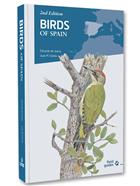Birds of Spain
- Publisher : Lynx Edicions
- Illustrations : 1000+ col illus, 300+ distribution maps
Our customers have given this title an average rating of 5 out of 5 from 1 review(s)
Customer Rating: 




Description:
2nd edition. Text English. This second edition is based on the thoroughly revised and updated fourth edition of Aves de España, the popular field guide to the identification of the birds of Spain, recommended by SEO/Birdlife.
This comprehensive guide covers all 599 bird species found in Spanish territories, including Peninsular Spain, Ceuta, Melilla, and the Balearic and Canary Islands, featuring:
* Comprehensive Coverage: It includes detailed descriptions of 599 species, with 191 classified as occasional or accidental, and 5 noted as extinct.
* Illustrations: The guide features over a thousand colour illustrations, with 129 new additions in this edition, highlighting key identification details for each species.
* Maps: Contains over 300 maps showing the distribution and presence of species throughout the year.
* Multilingual Index: For ease of reference, bird names are provided in Spanish, Catalan, Basque, and Galician.
* Enhanced Digital Content: QR codes link to the SEO/BirdLife Guide to the Birds of Spain, providing access to supplementary texts, illustrations, videos, photographs, and audio recordings of bird songs and calls.
* Dual Purpose: It serves as both a field guide for birdwatchers and a concise reference for those seeking an up-to-date overview of Spanish avifauna.
This edition caters to a wide audience, from beginners in birdwatching to experienced ornithologists seeking a reliable and comprehensive reference on Spanish birds.
Customer Reviews
Our customers have given this title an average rating of 5 out of 5 from 1 review(s), Click here to add your own review for this title.
Gehan de Silva Wijeyeratne on 10/8/2025 11:28:19 PM




 (5 out of 5)
(5 out of 5)
My spontaneous reaction to this book was an overarching impression of a book that seems clean and fresh and friendly to people whose birding is at a beginner or intermediate level. However, I should immediately add that the quality of the text and the structure of information is good enough to satisfy experienced birders. So why does this book seem like a friendly book for newcomers?
The answer seems to lie in the illustrations being much bigger, perhaps twice the size of other field guides. Plus, there is a pleasing painterly touch to the illustrations. This does not detract from the accuracy. The illustrations are life-like and have the accuracy of detail expected from an advance field guide. But nevertheless, they are pleasing and an interesting departure from the photo-realism style that has become more normal. Also, it may actually help newcomers to birding to have a book where the illustrations are easier on the eye and not too busy with several illustrations of different age class or sub-species plumages.
The identification aspects of the text is very good and reflects much of the recent advances in bird identification. In fact, as an ID guide, the book will work well anywhere in Europe for the regularly occurring species. The book is also compact and lighter than European gold standard, the Collins Bird Guide. For European birders flying into Spain for a short break and needing to carry everything in a day pack on a budget airline, this book is a good alternative. Especially so if you are a regular to Spain and are interested in in the distribution text which is specific to Spain. However, the clear, distribution maps cover the whole of the Iberian Peninsula, quite often extending to the North African coast as well. I would have been quite happy to have had this book on my last visit to Portugal because it would have been perfectly adequate as field guide for Portugal as well.
The text on distribution and abundance is Spain-centric. This book will serve well the many native English-speakers who visit regularly or have a second home in Spain. But wherever you are live in Europe, it is always to compare and contrast the relative abundance of some species of birds in your home country versus another you are visiting. Visiting birders may find this extra information of interest as field guides often omit that level of detail to remain compact. But this book manages to fit extra information in concisely and even in some cases information on sub-species or similar species whilst keeping the book relatively compact.
The text facing the pages have clear distribution maps. As with other field guides by Lynx Nature Books there are QR codes as well, on the text page facing the plates. These take you to the SEO Birdlife's Guia de Aves de Espana site in Spanish. What is most helpful is that you can then listen to the calls as well.
The main section ends with abbreviated accounts of rarities some of which are illustrated. The end pages include a good bibliography, a checklist of species, links to regional bird reports and other internet resources. All in all, its field guide that has been put together well and will be a good role model for other country level field guides which want to pack in a lot of information but nevertheless feel accessible those who have not crossed the line to being hard core birders.
You may also like...
A Photographic Guide to Small Mammal Bones in Barn Owl Pellets
Ramsey, S.J.; Crawley, D.
Price £20.00
Birds of New Guinea: Including Bismarck Archipelago and Bouganville
Gregory, P.
Price £49.99
(Save £6.01)
The North Sea Bird Club 1979-2019: Birds, bats and beasties - forty years of
Thorpe, A. (Ed.)
Price £23.50
Identification Atlas of the Continental Birds of Southwestern Europe
Blasco-Zumeta, J.; Heinze, G.-M.
Price £84.99











